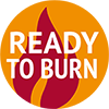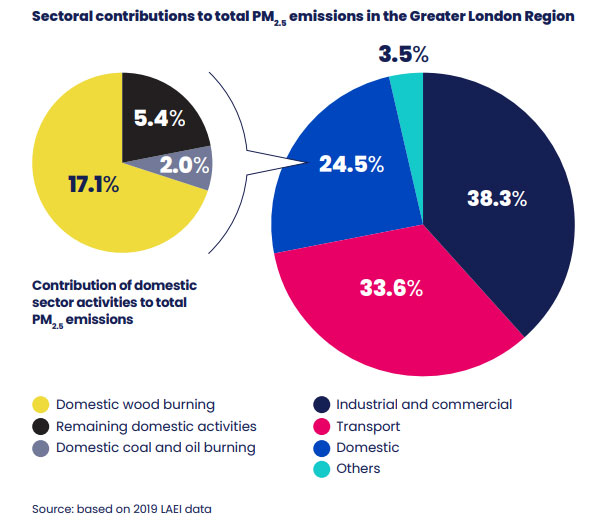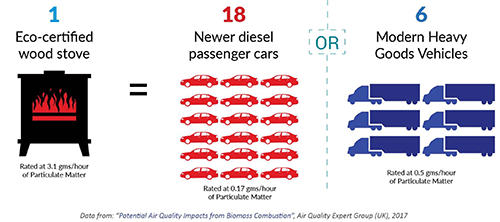Smoke control, domestic wood burners and bonfires
The Environmental Health team is responsible for controlling smoke and bonfires to improve air quality in the borough.
- Smoke control areas
- Using firewood and solid fuels
- Buying solid fuel stoves and wood burners
- Health impacts
- Environmental impacts
- Bonfires
- Report a problem
Smoke control areas
We discourage all forms of burning as it causes air pollution, can upset neighbours and can damage health (particularly of children, older people, and those with breathing and heart conditions).
A smoke control area is a legally defined area.
The whole of the borough has been designated as a smoke control area (SCA) since the first Clean Air Act of 1956.
Defra has recently tightened the legislation.
This means that:
- All inside burning in a SCA is strongly discouraged.
- If you choose to burn, once a fire is established, you should not emit smoke from a chimney. If you do so you could be in breach of the legislation and subject to a fine.
- If you do burn, you must only burn fuels authorised by Defra, and you are recommended to only burn in an appliance on Defra's list of exempt appliances such as some boilers, cookers, wood burners and stoves
- Whatever appliance or fuel you choose, smoke from it may result in a financial penalty under Schedule 1A of the Clean Air Act (as amended by the Environment Act 2021) in prohibition of smoke being released from a chimney within a smoke control area. This is because even eco-designed appliances can emit smoke, and if there are a number of these being used at the same time they may contribute to local air pollution. This can be significant,
Smoke must not cause a nuisance. Dry storage of fuel is very important because burning damp fuel may produce smoke. Under the Environment Act 2021 if a substantial amount of smoke is emitted from your chimney we may serve you with an abatement notice to stop the smoke followed by a fine.
If you are considering installing a wood burner, please think again. At the very least, check where the flue will exit. If it is near, below, or could blow towards an openable window, please do not install. This may be inconsiderate to neighbouring properties, unpleasant/unhealthy for yourself and may become a statutory nuisance for which an abatement notice may be served.
Using firewood and solid fuels
Fires are not a cost-effective way to heat your home. You can get advice on energy efficiency and ways to save money on heating and insulation from organisations such as the Energy Saving Trust.
Global Action Plan has advice on wood burners with the second Clean Air Night on Wednesday 22 January 2025.
We have more information on the health impacts and perceptions of indoor burning provided through the London Wood Burning Project. This is a joint Defra funded research and awareness raising project involving 15 London Local Authorities running from 2023 to 2024 and includes a health impacts evaluation report.
View the London Wood Burning Project's leaflet outlining the rules around burning wood and solid fuel.
Fires are bad for air quality inside and outside your home, so can damage your health - even if you're using exempt appliances and authorised fuels. We discourage the burning of wood and coal unless you have no alternative source of heating.
From 1 May 2021, it became an offence to sell unauthorised fuel in a Smoke Control Area under the Air Quality (Domestic Solid Fuels Standards) (England) Regulations 2020.
If you buy kindling, firewood or solid fuels for domestic use, look for the Ready to Burn logo. This means it will burn more cleanly and efficiently.

Visit Burnright for advice on getting the most from your fire and fuel.
Buying solid fuel stoves and wood burners
Since January 2022, all new wood-burning and multi-fuel stoves must adhere to strict emissions and efficiency regulations known as Ecodesign. When buying wood-burning or multi-fuel stoves, look for one of these logos:

or

This is an efficiency accreditation scheme where wood burners and stoves pass rigorous tests to determine their emission and efficiency outputs. Appliances are given a rating from 1 to 5 based on their emissions and efficiency. For anyone planning to install, replace or retrofit a wood burner in Richmond borough, we encourage you choose appliances with a rating of 4 or 5, as these have lower emissions.
From 31 January 2023 new legislation came into force following the publication of the Environmental Improvement Plan 2023. The limit that new stoves in Smoke Control Areas must meet, has been reduced from 5g of smoke per hour to a new maximum of 3g/h.
It should be noted that some newer Eco-design stoves emit 3.1g/h, which exceeds the new limit of 3g/h, so can not be purchased and installed after 31 January 2023 in Smoke Control Areas, such as Richmond borough. It is your duty to check.
Older appliances approved before 2010 may be considerably less efficient and more polluting than newer models and may not be installed for use in a smoke control area such as Richmond borough after 31 January 2023. Please note, if the appliance is already installed, it is not illegal to use it but it must not emit substantial smoke from the chimney.
Health impacts
Burning wood and coal at home emits dangerous pollution known as fine particulate matter (often referred to as PM2.5), which is a known carcinogen and can cause asthma, heart disease and other serious illnesses affecting our lungs, hearts and brains. Exposure to particulate air pollution can also trigger the symptoms of existing health conditions.
Current evidence suggests there is no safe level of PM2.5, and both short-term and long-term exposure to PM2.5 increases the risk of early deaths from respiratory and cardiovascular diseases.
The chart below illustrates the breakdown of the contributions to PM2.5 emissions from the key sectors included within the London Atmospheric Emissions Inventory (LAEI).
As shown below, domestic emissions in London account for approximately a quarter of total PM2.5 emissions. More specifically, wood burning is the largest source of domestic emissions, and accounts for approximately 17.1% of total PM2.5 emissions in the Greater London region. The burning of solid fuels in domestic settings is therefore a key contributor to PM2.5 emissions in the Greater London region.

The above is an extract from the Health Impact Assessment Report carried out by Ricardo Energy & Environment in 2023 for participating councils, including Richmond, in the London WoodBurning Project.
Environmental impacts
In Richmond borough, wood burning is a significant and generally avoidable source of PM2.5, which is why controlling domestic burning is such an important issue.
The hourly PM2.5 emissions (in grams per hour (g/h)) from 1 eco-certified wood burning stove (3.1 g/h) is equal to 18 newer diesel passenger cars (each rated at 0.17 g/h) or 6 modern heavy goods vehicles (each rated at 0.5 g/h).

Data from Potential Air Quality Impacts from Biomass Combustion, Air Quality Expert Group (UK), 2017.
Enforcement
You must also be aware that even if you have installed an exempt appliance and are burning authorised fuel, people who emit smoke from their chimney could be causing a “statutory nuisance” under Part 3 of the Environmental Protection Act 1990 if the smoke emissions are harmful to health or a nuisance.
If sufficient evidence is obtained a financial penalty can be issued to the person responsible such as the occupier of the building with the chimney, for example, the homeowner or the tenant.
Department for Environment, Food & Rural Affairs' (DEFRA) have produced a practical guide to smoke control areas covering the above topics.
Bonfires
We strongly encourage you not to have bonfires because smoke from bonfires is harmful to health, especially for people with breathing difficulties, including those with or recovering from coronavirus. You are encouraged to use our green waste collection service or compost your garden waste at home.
Domestic bonfires
Although there are no byelaws covering bonfires in the borough, if a bonfire is considered to be a statutory nuisance the council could take formal action. Having a bonfire is unnecessary and can affect neighbours as well as contributing to poor air quality. If you do have a bonfire, follow our guidance on the precautions you should take.
There are environmentally friendly ways of disposing of garden waste and household items. Rather than causing unnecessary pollution by burning items and waste, you can:
- Compost your garden waste at home
- Garden waste recycling and collection - you can order garden recycling bags for occasional use or join our collection service if you produce garden material regularly
- Take many items to the Townmead Reuse and Recycling Centre in Kew
- Use local recycling sites
- Request a bulky waste collection from your home
- Alternatively you could sell or give away unwanted items - there are many websites and apps available to help you, or you can donate them to charity
- Use community reuse and recycle schemes
- Use social media groups or websites like eBay, Gumtree, or Facebook Marketplace
Bonfires on allotments
Bonfires are not permitted at any time on Council allotments. Information about allotments including the terms and conditions for plot holders is given on our Allotments page.
Bonfires are discouraged on private allotments. Compost your waste, take it home or take it to Townmead Reuse and Recycling Centre.
Commercial waste and bonfires
Commercial waste must not be disposed of by burning.
Contractors carrying out work at your property must not use bonfires to burn waste and you must ensure that they arrange for proper disposal of waste from your property.
View our commercial bonfires page for more information.
Barbecues in public places
Barbecues are not permitted at any time in any Council or Royal Park in the borough. You should always check the restrictions for other open public spaces owned or managed by private organisations, such as Marble Hill House Park (English Heritage), Kew Gardens (Royal Botanic Gardens) and Hampton Court Palace Grounds (Historic Royal Palaces).
Tobacco Smoking
From 1 July 2007, virtually all enclosed public places in England became smoke-free. The total ban on smoking extends to all enclosed public areas, with a few designated exceptions. Private dwellings do not have to be smoke-free.
See our Smoke-free legislation page for more details.
Report a problem
You can report a smoke or bonfire problem via a form on our website where you can also read our statutory nuisance guidance.
If smoke from a bonfire is causing a danger to traffic contact the police. If you feel that the bonfire is a danger to people and property you should call the fire brigade. The emergency services number is 999.
Up to: Air pollution
Updated: 27 March 2025
 Stay up to date! Make sure you subscribe to our email updates.
Stay up to date! Make sure you subscribe to our email updates.
